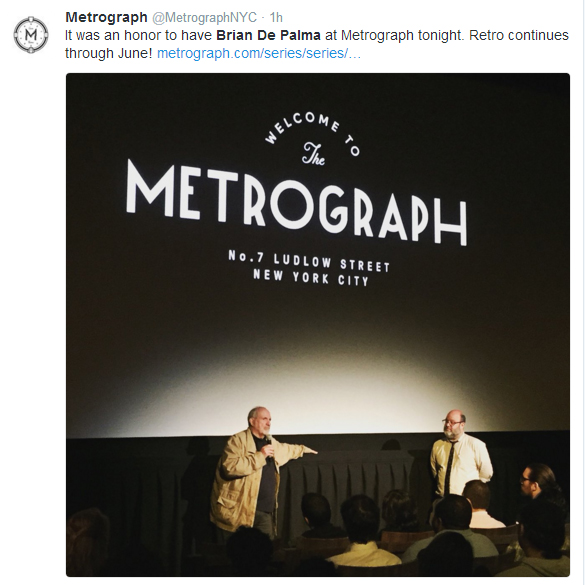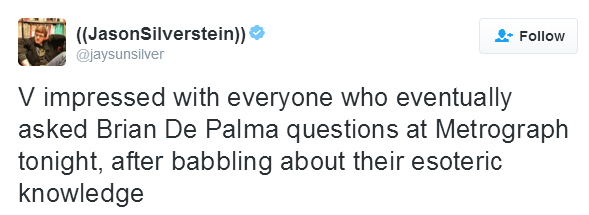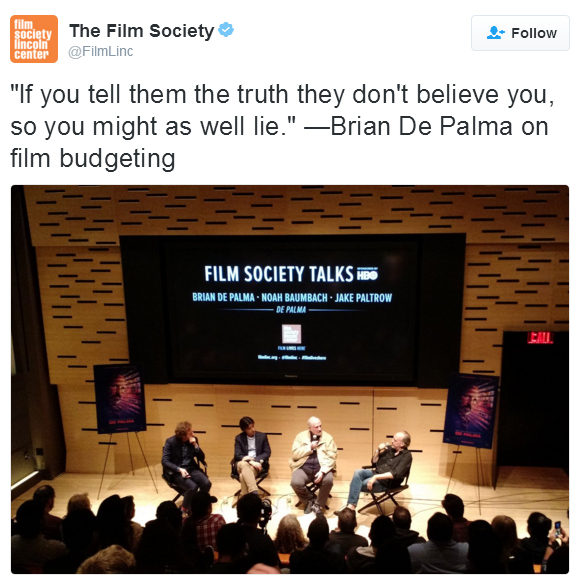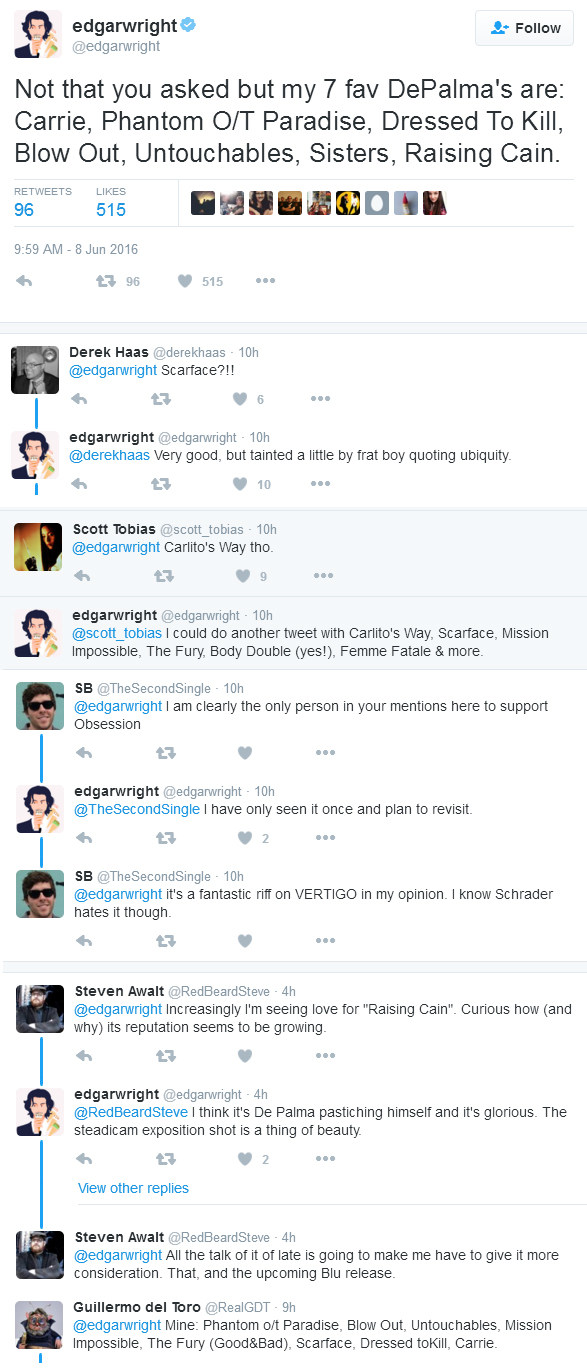INCLUDING VIDEO POSTED TO INSTAGRAM; ALSO, PALTROW SOLO INTERVIEW
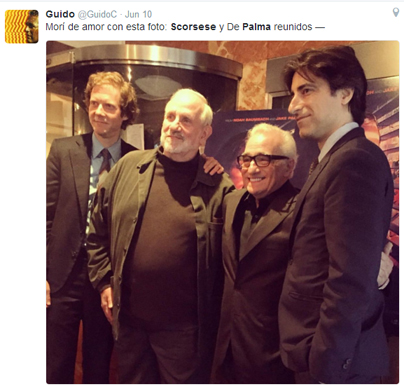 W Magazine's Ally Betker was at the DGA Theater screening of De Palma Thursday night, and posted an article the other day that started with a bit of Martin Scorsese's introduction:
W Magazine's Ally Betker was at the DGA Theater screening of De Palma Thursday night, and posted an article the other day that started with a bit of Martin Scorsese's introduction:“So I guess I’m the warmup,” said Martin Scorsese Thursday night at the Director’s Guild of America theater on 57th Street. That Scorsese was anything less than the main event speaks to the man he was introducing: Brian De Palma. The director of Body Double, Scarface and Carrie, among many, many others, was getting his own film treatment with a documentary on his oeuvre by Noah Baumbach and Jake Paltrow.Simply titled De Palma, the doc is a live motion version of the director’s IMDb page, filmed as one long interview spliced with clips of his films. Though he was known for his bloody psychological thrillers (he was constantly combating the ratings board, often ending up with an X-rating), De Palma also had quite the reputation as a mentor—which is how his relationship with Baumbach (Frances Ha, Mistress America) and Paltrow first started. As well as with Scorsese: “Brian was the one who took my film, Who’s That Knocking at my Door, and me seriously, and sort of became a mentor in a way, supporting me all the time—arguing usually—but supporting, guiding me. And the biggest thing, introducing me to everyone he knew in Hollywood,” said Scorsese. “He would come in and help me edit Mean Streets; I was constantly having severe asthma bouts and he would come pick me up at the hospital, drive me home; he arranged for a mutual friend to introduce me to Rob DeNiro, which led to those films; he gave me the script to Taxi Driver.”
Hopefully more video of the introduction will pop up soon, but for now, Instagram user gabrielecapo posted a partial video in which Scorsese talks about De Palma being talked up to Scorsese's film class as a "big star," having won awards for his short film Woton's Wake. (De Palma was set to come to the school.) The audience laughs when Scorsese says the title, Woton's Wake, after which Scorsese stresses again that this was an award-winning film, and that De Palma was seen in the film school world at the time as a "big star."
PALTROW: "IN A MOVIE LIKE THIS, THE EDITING IS THE DIRECTING"
Betker later talked with Jake Paltrow at the after party at The Russian Tea Room. When asked if he could recall the first De Palma film he'd ever seen, Paltrow replies, "It was Body Double, and I saw it on VHS. I wasn’t allowed to see R-rated movies and I talked my parents into letting me see it because I was a big Hitchcock fan. And I said, 'Oh, there’s this movie by Brian De Palma,'—who they obviously knew and liked—'it’s a little like Rear Window…' And then I was sort of scarred by it, I mean in a good way, it really stuck with me."
When asked if he and Baumbach had to direct De Palma at all while making the film, Paltrow replies, "In a movie like this, the editing is the directing. The filming of it is just an extension of these conversations you’re having at dinner. And trying to just maintain the same intimate thing where everybody feels comfortable to talk about things in a way you wouldn’t with an interviewer."
When asked if his own directing has been influenced by De Palma's, Paltrow responds, "More and more in a way. Brian’s feeling about visual storytelling, and this idea of making these movies in a sort of visual way first has become a stronger influence now as I get older. Even though he’s always been an influence, I think I understand what he’s talking about better now than I did before. When he talks about the Hitchcockian visual story telling, it’s related to that."




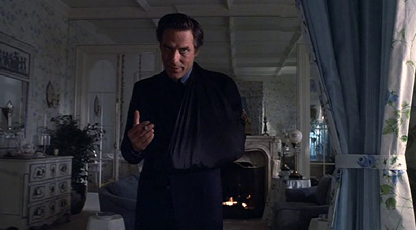 Not to present a sort of "point/counterpoint," but the articles about the new documentary De Palma by
Not to present a sort of "point/counterpoint," but the articles about the new documentary De Palma by 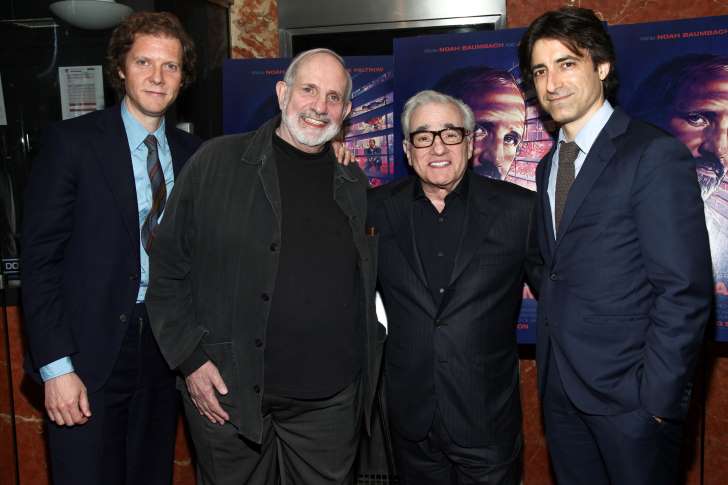
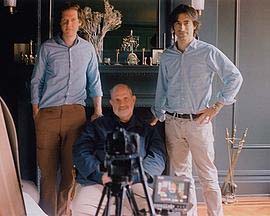 Go to
Go to 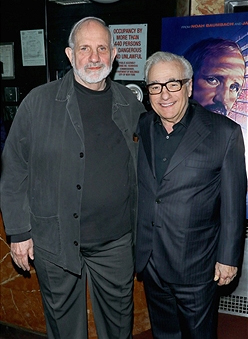 Martin Scorsese introduced a screening of De Palma last night at the DGA Theater in New York City. According to a tweet from
Martin Scorsese introduced a screening of De Palma last night at the DGA Theater in New York City. According to a tweet from 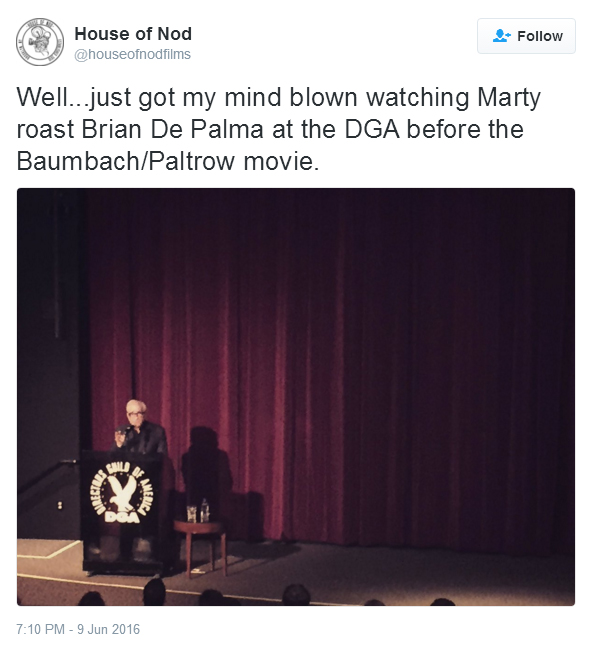
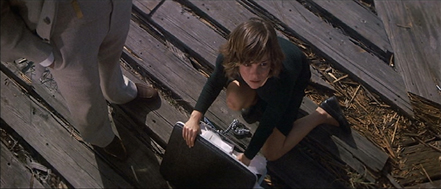 Last week, as the Brian De Palma retrospective was beginning at The Metrograph,
Last week, as the Brian De Palma retrospective was beginning at The Metrograph, 